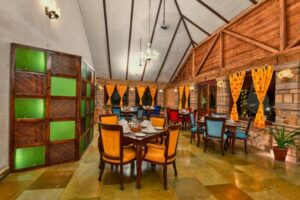Team L&M
Earthian Hotels N Resorts which operates ‘The Earth at Ranthambore‘ in Rajasthan offering sustainability as a way of life, is all set to open two new experiential locations. The most sustainable hotel in Sawai Madhopur is all set to open a new café and a bar on its premises, giving its guests more options to unwind.

With around 30 covers each, the new Café will be located next to the open dining area “Rasa” amidst chirping birds offering Chef special bakery dishes, including cookies, doughnuts, bagels, pastries, brownies, desserts, and Pizzas with a special blend of Coffee. The bar has two options, one next to the pool and the other close to the multi-cuisine restaurant (Tattva) with special Rajasthan Liquor offerings like Amrut, Ganganagar, Somras, Royal Ranthambore & Kesar Kasturi among others.
Says Rohit Pareek, Managing Director of Earthian Hotels N Resorts, ” Now that the green beautification across the resort is complete this additional café & bar experience will give the guest an immersive experience to sit amongst the cool breeze and enjoy reading a book with our specially brewed coffee or have a laugh sitting with a friend at the bar”.
Guests can enjoy daily activities, including wildlife documentaries, pottery wheel demonstrations, Rajasthani cultural performances, magic shows during high tea, and gourmet meals.
Outdoor Dining at The Earth Ranthambore
Offering Ranthambore’s only rammed mud and cob Earth Cottages and designed by famous Architect, Winner of the first Laurie Backer award, Urban Designer, and Heritage Conservator Eugene Pandala, The Earth at Ranthambore offers lush green surroundings, a swimming pool (Taranaalya), and a recreation hall.
One can experience the colours of Rajasthan here or witness captivating folk performances and wildlife documentaries at Kriya, the open-air amphitheatre or Relax and rejuvenate at the spa, Sattva. “We plan to take this model across all our upcoming resorts” adds Pareek.
Besides the new cafe, The Earth at Ranthambore within its premises also boasts of the unique Miyawaki Forest, a Japanese afforestation technique for cultivating fast-growing groves of native plants, with the dense, mixed planting intended to simulate the layers of a natural forest.